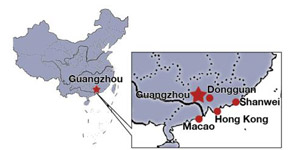|
In addition to 12 new venues, 58 existing sports venues in Guangzhou and nearby cities will serve the event through adaptive renovation.
"It is one of our goals that citizens will benefit most from the Games after the event," Gong said.
Security concerns
Security is another important concern for the GAGOC as Guangzhou accommodates a migrant population much larger than its permanent population.
"Guangzhou is a much safer city now," said Zhang Zhengui, Deputy Director of GAGOC's Department of Security Guarantee. The city has witnessed double-digit decreases in crimes, and marked decreases in occurrence of traffic accidents and fires since 2004.
Being south China's manufacturing hub and attracting large numbers of migrant workers, Guangzhou has accumulated a wide range of experiences in managing migrant populations, Sun said. These include incentives that encourage migrant workers to be regular residents in order to obtain permanent residence permits, medical insurance and other social welfare.
The GAGOC also adopts successful practices from the Beijing Olympic Games, such as the introduction of crisis management schemes.
While adopting security standards from the Beijing Olympic Games, the GAGOC has invested heavily in a powerful video inspection system in which there is no dead angle in any venue, said Zhang.
"The security work is service-oriented-while ensuring their safety, we stressed helping all athletes in a flexible and agreeable way," Zhang said.
Traffic scheme
Guangzhou will take two thirds of its vehicles off the road during the event to improve air quality and ease traffic congestion, another tactic learned from the Beijing Olympic Games.
The traffic restriction scheme consists of three measures, said Ding Hongdu, Director of the Guangzhou Environmental Protection Bureau.
An "odd-even" car restriction scheme will be effective from November 1 to December 22 of this year, during which cars will be banned on alternate days depending on their license plate numbers end in odd or even numbers. The 52-day control will not apply to public transport and the Games' support vehicles.
In addition, vehicles with plate numbers sharing the same last number with the day's date will stay off the road between November 10 and December 19. And from October 12 to December 22, all running vehicles in Guangzhou will have to meet emissions standards, and show green environmental labels issued by the Chinese Ministry of Environmental Protection.
It is estimated about 871,000 vehicles will be off the roads each day, accounting for 64.5 percent of the city's total, Ding said.
About Guangzhou

Longitude: 12°57' - 114°3' E
Latitude: 22°26' - 23°56' N
Area: 7,434.4 square km
Population: 10.26 million
Climate: Typical subtropical, humid | 